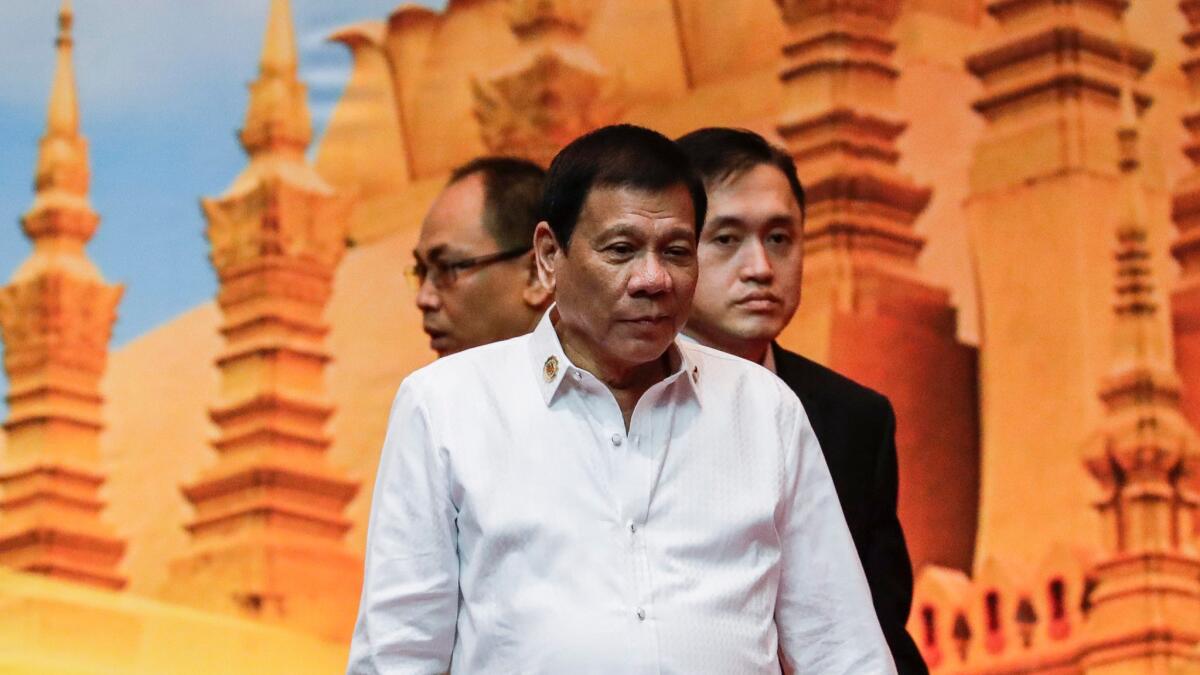Editorial: Philippines President Rodrigo Duterte’s murderous approach to law enforcement must end

- Share via
In the two months since Rodrigo Duterte was sworn in as president of the Philippines, more than 2,400 putative drug dealers and addicts have been killed – more than half of them apparently by vigilantes, the rest at the hands of police. Many of the dead, who include children as young as 4 years old, have been targeted based on little more than suspicion. It’s an astounding campaign of violence, and it is no mere coincidence: Running as a law-and-order candidate, Duterte was elected in May by promising that 100,000 criminals would be killed in his first six months in office.
Duterte grabbed headlines over the weekend after using an expletive — something Duterte is fond of doing — as he warned President Obama to not bring up the extrajudicial killings in a planned one-on-one meeting during a regional summit in Laos this week. Obama responded by saying that if they were to meet, he most certainly would bring up the blatant human rights abuses, and then he canceled the meeting after determining there was little to be gained from it.
That’s an unfortunate state of affairs between two important allies in Southeast Asia, and the timing is particularly bad. China has roiled the region by building military airstrips and outposts on disputed reefs and small islands in the South China Sea, and used its coastal police to harass other countries’ fishing fleets. The Obama administration has accused China of militarizing a trade route through which more than $5 trillion worth of goods moves each year, and has been trying to strengthen alliances in the region to counter China’s expansionist actions.
The Philippines recently prevailed in a complaint filed with an international arbitration court at The Hague accusing China of violating the United Nations Convention on the Law of the Sea by claiming jurisdiction over islands and shoals that, the arbitration tribunal ruled, were too small to be used to define broader territorial claims. China has rejected the tribunal’s authority and said it would not abide by its ruling, preferring instead to settle disputes in bilateral negotiations in which it will have far more leverage.
Navigating these diplomatic waters will not be easy, and will require delicate regional negotiations to ensure fair access to natural resources and to keep the shipping lanes open and safe. Duterte, though, is a complicating factor. With Duterte’s murderous approach to law enforcement, the U.S. government finds its geopolitical interests aligned with a political leader that former Filipino President Benigno Aquino III once described as a “dictator in waiting.”
The details of the extrajudicial killings are stunning. From July 1 to Aug. 19, the Philippine National Police reported killing 712 people it described as “drug pushers and users,” a 10-fold increase over the first six months of the year. Police said the victims resisted arrest with gunfire, a transparently false claim. At least two were beaten and then shot dead in jail cells. A 4-year-old girl was shot and killed when police opened fire on her father as he was taking her via motorcycle to buy popcorn. Despite reports that police were getting bonuses for each criminal or suspect executed, and that some citizens were being hired as contract killers, Duterte has rejected calls for an independent investigation.
In addition, death squads or vigilantes urged on by Duterte have killed more than 1,000 people. About 600,000 addicts and other people involved in the drug trade have turned themselves in, many hoping for treatment — and to avoid being killed. In a McCarthy-like moment, Duterte released a list of 150 names of elected officials and other public figures he said were part of the drug world, and ordered them to surrender. Sen. Leila de Lima, who had called for an investigation into the police killings, subsequently found herself the target of Duterte and his supporters, who alleged that she herself has drug world connections (she was not included on his initial list).
Obama — and his successor in January — will have find a way to achieve U.S. aims in the South China Sea while pushing Duterte into compliance with international standards on both human rights and due process. The administration could start, as Human Rights Watch suggests, by withholding aid for training and mentoring the Philippine National Police until the killing campaign is investigated. U.S. tax dollars shouldn’t support law enforcement officials engaged in profound violations of human rights.
Follow the Opinion section on Twitter @latimesopinion and Facebook
MORE FROM OPINION
How do you find the firestarters when California burns?
Proposition 58 would bring back bilingual education in California. And that’s a good thing.
Should Venice secede from Los Angeles?
More to Read
A cure for the common opinion
Get thought-provoking perspectives with our weekly newsletter.
You may occasionally receive promotional content from the Los Angeles Times.










